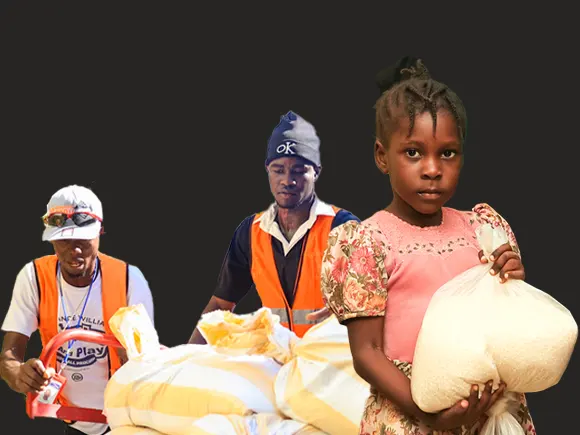Lack of Food, Rise in Violence and COVID-19 Cases Push Haiti Deeper Into Crisis
COCONUT CREEK, Fla. (June 23, 2021) Food For The Poor is poised to ship additional food to Haiti to help families in desperate need as a humanitarian crisis brought on by continued civil unrest, gang violence and a spike in COVID-19 cases has seized the country.
Enough food has arrived at the charity’s Coconut Creek warehouse to fill two 40-foot tractor-trailers, with more expected to arrive soon that will be shipped to Haiti.
“Because there is such a lack of jobs, people really have no purchasing power,” said Food For The Poor President/CEO Ed Raine. “What food there is, people can’t afford to buy. It really has become one obstacle after another. Thanks to our generous donors, we are able to purchase and ship food that’s so desperately needed in Haiti.”
FFTP has 136 containers of aid either en route to Haiti, at the port or in the warehouse in Port-au-Prince.
UNICEF reports that severe acute childhood malnutrition is expected to more than double this year in Haiti due to the pandemic and rising crime. About 4.4 million people out of a population of 11 million are estimated to be food insecure in Haiti, including 1.9 million children. The agency warned that the hurricane season is likely to worsen access to nutritious food.
The charity has become the sole source of food for many people who had relied on multiple sources before the crisis, but now are only relying on FFTP.
“People are suffering,” said Mario Nicoleau, FFTP-Haiti’s Chief Operating Officer. “Those that could eat before are eating less. Those who were eating little are not eating at all.”
FFTP aims to purchase as much food as possible in Haiti to boost businesses.
“We also need to foresee bringing in lots of food. But we should purchase everything we can locally because once the country opens up, those local businesses will need that help,” Nicoleau said. “I’m just fearful that there won’t be enough because they’re not able to bring goods in like they used to before.”
Haiti also faces gasoline shortages with long lines of cars and motorcycles reported at stations in Port-au-Prince for the past week because roadblocks and gang violence are preventing tanker tanks from leaving a terminal in Carrefour to haul gasoline to the rest of the country.
A human rights organization, the Center for Analysis and Research in Human Rights, reported about 10,000 people have been displaced in the first two weeks of June alone.
The charity has provided food to as many as 3,000 refugees from Martissant taking shelter in a sports center in Carrefour. The dry goods, including rice donated to FFTP by the Republic of China (Taiwan), enabled community leaders to serve an average of 3,000 meals per day to families sheltering there.
In South Florida, two twin teenagers moved by the crisis in Haiti turned to their skills and made face shields on their personal 3D printer and laminator to give health care workers another layer of protection.
David and Jonathan Tamen, who will be seniors this fall at Miami Beach Senior High School, made 42 plastic face shields and donated them to Food For The Poor, which will send them to first responders at Bernard Mevs Hospital in Port-au-Prince. The 17-year-olds delivered them in person this week to the charity’s office.
“We’re happy that we can help Haiti in this way,” David said. “It’s good to know that one or two people can make such a big difference.”
“Every little bit counts,” Jonathan said. “Anybody with a 3D printer can help in this way.”
David figured out how to make the shields a year ago when protective equipment was in short supply in South Florida and elsewhere in the United States. Jonathan came up with the idea to recruit fellow students at their school’s robotics team to make them and then sought out entities that could use them, such as first responders in the City of Miami Beach and health care workers at Jackson Memorial Hospital in Miami, and staff at their school.
As of Wednesday, more than 17,700 cases of COVID-19 in Haiti had been reported, 2,000 more than the beginning of the month, according to worldometers.info.
At a time when hospitals should be focused on saving patients, they are strained not only by the increased violence but by a lack of equipment.
“We are incredibly grateful to David and Jonathan Tamen for using their skills to make a product that is desperately needed in Haiti to keep medical staff and first responders safe,” FFTP’s Raine said. “Seeing compassion in those so young encourages all of us to do what we can.”
There are three ways donors can help FFTP deliver aid to Haiti:
- Make a cash donation. Go to www.foodforthepoor.org/haitirelief.
- Purchase and donate items through FFTP’s AmazonSmile Charity List: www.FoodForThePoor.org/emergencysupplies.
- Bring canned goods to the charity’s Coconut Creek warehouse, 6401 Lyons Road, from 9 a.m. to 4 p.m. weekdays. For more information on the specific items accepted, please go to www.FoodForThePoor.org/help-now/haiti-crisis/
Food For The Poor, one of the largest international relief and development organizations in the nation, does much more than feed millions of hungry children and families living in poverty primarily in 17 countries of the Caribbean and Latin America. This interdenominational Christian ministry provides emergency relief assistance, clean water, medicine, educational materials, homes, support for vulnerable children, care for the aged, skills training and micro-enterprise development assistance. For more information, please visit www.FoodForThePoor.org.
Michael Turnbell
Public Relations
954-427-2222 x 6054
michaelt@foodforthepoor.com
